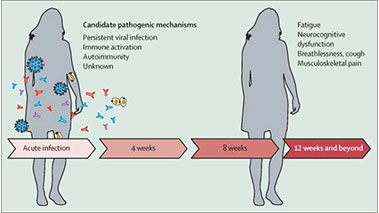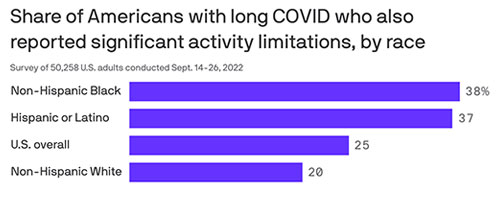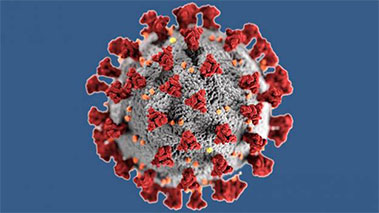
Long COVID, also known as post-acute sequelae of SARS-CoV-2 infection (PASC), refers to a range of symptoms that persist for weeks or months after the acute phase of COVID-19 infection has resolved. These symptoms can include fatigue, brain fog, difficulty concentrating, shortness of breath, chest pain, and others. The exact cause of long COVID is not yet fully understood, but it is thought to be related to the body’s immune response to the virus, as well as to damage to the lungs and other organs. Researchers are still studying long COVID, and more information about it is becoming available as more people recover from COVID-19.
Long covid symptoms
Long COVID symptoms can vary widely, but some common ones include:- Fatigue: feeling extremely tired and lacking energy, even after rest
- Brain fog: difficulty concentrating, remembering things, or thinking clearly
- Shortness of breath: feeling out of breath, even when not physically exerting oneself
- Chest pain: pain or discomfort in the chest
- Headaches
- Joint and muscle pain
- Difficulty sleeping
- Anxiety and depression
- Loss of sense of smell or taste
- Heart palpitations
Long term effects of covid
The long-term effects of COVID-19 are still being studied, but some potential long-term effects that have been reported include:- Lung damage: Some COVID-19 patients may experience ongoing lung problems, such as difficulty breathing and chest pain, even after recovering from the acute phase of the illness.
- Heart damage: COVID-19 can increase the risk of heart damage, including inflammation of the heart muscle (myocarditis) and blood clots (thrombosis).
- Neurological effects: Some people with COVID-19 may experience neurological symptoms, such as confusion, headaches, and loss of taste or smell, which persist for weeks or months after recovery.
- Mental health effects: COVID-19 can take a toll on mental health, causing anxiety, depression, and post-traumatic stress disorder (PTSD).
- Fatigue: Many people with COVID-19 experience persistent fatigue that can last for months, even after they have recovered.
- Multisystem Inflammatory Syndrome in Children (MIS-C) is a rare but serious condition that can happen in children and adolescents who have been infected with COVID-19.

Long Covid Treatments
The treatment of long COVID can vary depending on the specific symptoms and severity of the condition. Some common treatments include:- Symptomatic treatment: This can include medications to relieve specific symptoms, such as pain relievers for muscle and joint pain, or antidepressants for anxiety and depression.
- Physical therapy: This can help improve lung function and reduce fatigue.
- Occupational therapy: This can help people with long COVID return to work or other daily activities.
- Supportive care: This can include things like counseling and support groups to help people cope with the emotional and psychological effects of long COVID.
- Rehabilitation: This can include a range of therapies and exercises to help people regain strength, stamina, and overall health.
- Vitamin D and other supplements: Some studies suggest that vitamin D deficiency may be linked to a higher risk of severe COVID-19 and long-term symptoms, so vitamin D supplements may be beneficial.
- Immunomodulatory therapy: Some studies are investigating the use of immunomodulatory therapy, such as steroids, to help reduce inflammation and improve outcomes in patients with long COVID.
Covid long haulers
 Long haulers may experience a wide range of symptoms, including fatigue, brain fog, difficulty concentrating, shortness of breath, chest pain, headaches, joint and muscle pain, difficulty sleeping, anxiety, depression, and loss of sense of smell or taste. These symptoms can be debilitating and can have a significant impact on a person’s ability to work, care for themselves, and participate in daily activities.
The exact cause of long haul COVID symptoms is not yet fully understood, but it is thought to be related to the body’s immune response to the virus, as well as to damage to the lungs and other organs. Many long haulers have reported that their symptoms began to improve gradually over time, but for some people, symptoms persist for many months and can be severe.
It is important to note that long haulers have different symptoms and different degrees of severity, and that it is important to consult a healthcare professional for proper diagnosis and treatment.
Long haulers may experience a wide range of symptoms, including fatigue, brain fog, difficulty concentrating, shortness of breath, chest pain, headaches, joint and muscle pain, difficulty sleeping, anxiety, depression, and loss of sense of smell or taste. These symptoms can be debilitating and can have a significant impact on a person’s ability to work, care for themselves, and participate in daily activities.
The exact cause of long haul COVID symptoms is not yet fully understood, but it is thought to be related to the body’s immune response to the virus, as well as to damage to the lungs and other organs. Many long haulers have reported that their symptoms began to improve gradually over time, but for some people, symptoms persist for many months and can be severe.
It is important to note that long haulers have different symptoms and different degrees of severity, and that it is important to consult a healthcare professional for proper diagnosis and treatment.
Covid long haulers symptoms covid
Covid long haulers, also known as post-acute sequelae of SARS-CoV-2 infection (PASC), refers to individuals who continue to experience symptoms for weeks or even months after recovering from COVID-19. These symptoms can include fatigue, brain fog, difficulty concentrating, shortness of breath, chest pain, heart palpitations, joint and muscle pain, sleep disturbances, and emotional symptoms such as anxiety and depression. The exact cause of these symptoms is not yet fully understood, but it is thought to be related to the body’s immune response to the virus, as well as potential damage to organs and systems.Post covid symptoms
Post-COVID symptoms, also known as “long-haul” or “long-term” symptoms, refer to the wide range of symptoms that can persist for weeks, months, or even longer after recovering from COVID-19. These symptoms can vary widely, but some common examples include:- Fatigue: This can range from feeling more tired than usual to complete exhaustion and can persist for weeks or months.
- Brain fog: This can involve difficulty concentrating, memory problems, and a general feeling of confusion.
- Shortness of breath: Some people continue to experience shortness of breath, even after the acute respiratory symptoms of COVID-19 have resolved.
- Chest pain: Some people report experiencing chest pain or discomfort, which can be related to inflammation in the lungs or other organs.
- Heart palpitations: Some people continue to experience heart palpitations or other heart-related symptoms, which can be related to inflammation in the heart or blood vessels.
- Joint and muscle pain: Some people continue to experience pain in the joints or muscles, which can be related to inflammation in these areas.
- Sleep disturbances: Some people continue to experience sleep problems, such as insomnia, vivid dreams, or nightmares.
- Emotional symptoms: Some people continue to experience emotional symptoms, such as anxiety, depression, or irritability.

